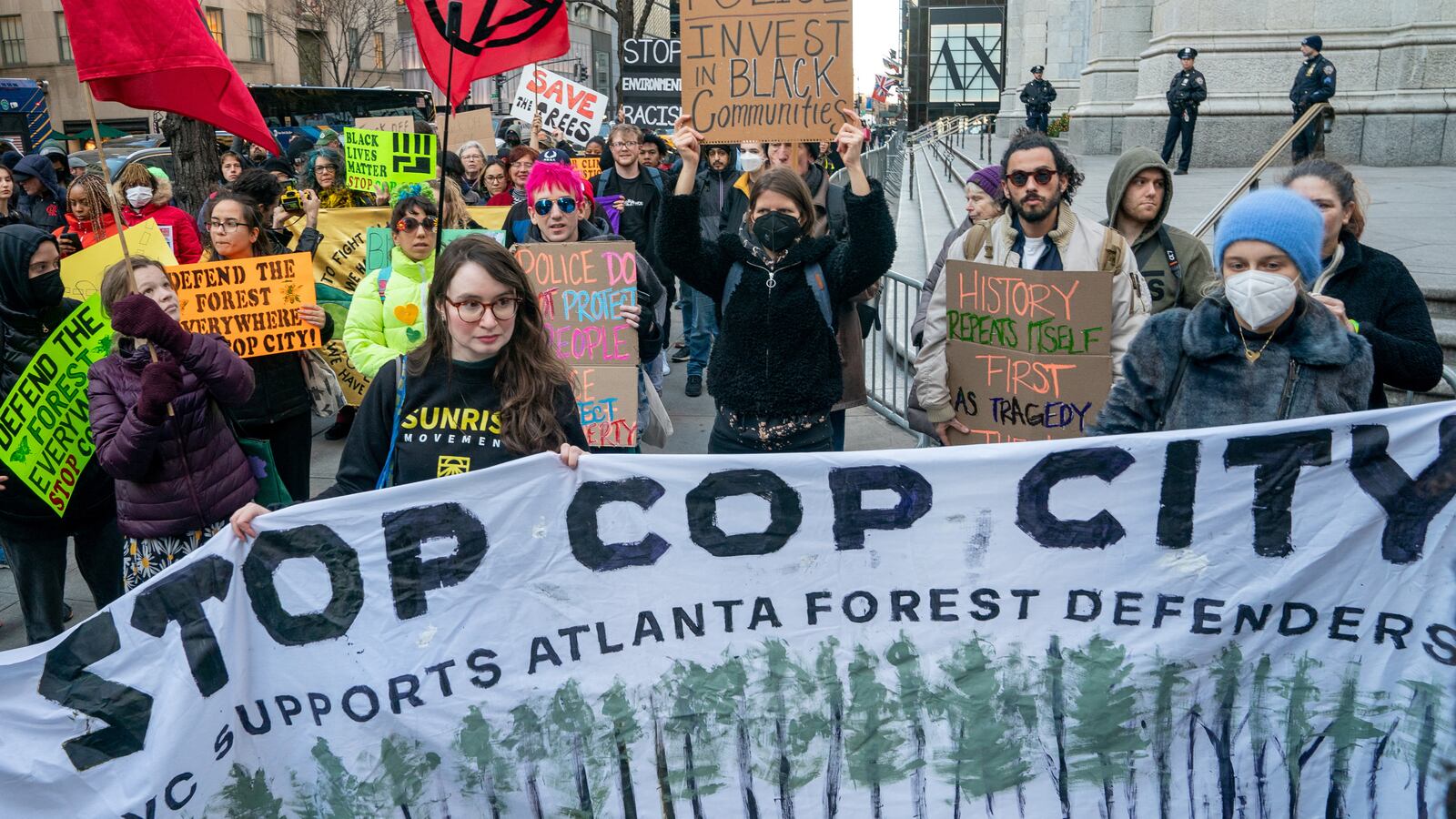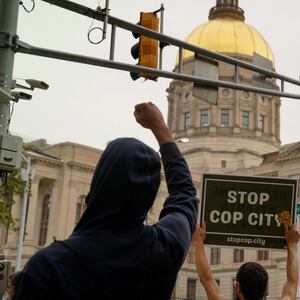Georgia prosecutors have filed racketeering charges against 61 people accused of involvement with “Stop Cop City,” a protest movement against a controversial Atlanta police training facility.
The charges were filed last week, according to online court records. The list of defendants suggests that the case implicates people who have already been arrested on tenuous evidence, like a legal observer who was jailed while monitoring protests, activists who ran a bail fund for other defendants, and a trio of activists arrested while handing out fliers with the name of a cop who killed a fellow protester.
The RICO charges come as Georgia’s RICO statute receives national attention. Donald Trump and a collection of his associates were charged under the state’s severe RICO statute last month. A person convicted on RICO charges in Georgia cannot be pardoned by the governor. Only the Georgia State Board of Pardons and Paroles can issue RICO pardons in the state, and even then, only after a person has served five years of their sentence.
The same grand jury that indicted Trump on RICO charges also indicted the Stop Cop City defendants, the Atlanta Journal-Constitution reported on Tuesday.
The Cop City Vote Coalition, a group that gathered more than 100,000 signatures to put the facility’s construction up for a vote this year, condemned the charges as “authoritarian” measures by Georgia Attorney General Chris Carr. The group also noted that charging documents describe the alleged racketeering scheme as beginning before the police training facility was even announced.
“Further, the documents use the day George Floyd was murdered as the date the alleged criminal acts began,” the group said in a statement. “This is months before anyone was even aware of Cop City, and is a clear assault on the broader movement for racial justice and equity. Carr’s actions are a part of a retaliatory pattern of prosecutions against organizers nationwide that attack the right to protest and freedom of speech.”
Lauren Regan, executive director of the Civil Liberties Defense Fund, which has been working in support of defendants, said the scope of the case is designed to dissuade people from supporting the Stop Cop City movement.
“It’s been very clear that Georgia’s intentions in how they’ve conducted themselves regarding the resistance to Cop City has been to try and scare even above-ground, law-abiding participants from taking part,” she told The Daily Beast. “I think by roping in a legal observer, and people running a nonprofit, and running a lawful bail fund, is absolutely intended to scare people from supporting this cause now and into the future.”
In September 2021, Atlanta approved plans to build a police training facility (dubbed “Cop City” by opponents) in the city’s South River Forest. The plans were controversial; approximately 70 percent of locals who weighed in during a public comment session opposed the facility, citing its cost (more than $90 million), its environmental impact, and its potential effect on over-policing in Atlanta.
When the city moved ahead with plans for construction, activists protested on the proposed construction site. Police shot and killed one protester, Manuel “Tortuguita” Esteban Paez Terán, in January, when they accused Terán of firing a gun. Subsequent autopsies have cast doubt on those claims. Soon after Terán’s killing, police charged 19 more “Stop Cop City” activists with terrorism, despite many being accused of nothing more than misdemeanor trespassing around the proposed construction site.
In a later crackdown, police conducted mass arrests at a Stop Cop City music festival, accusing some people of engaging in property damage at a nearby protest, on the questionable basis that those people allegedly had mud on their shoes. (The music festival was held in a forest.)
“They were doing things like snatching and grabbing people indiscriminately and they ended up grabbing several legal observers who were there doing a protected job, which is to monitor protests,” one music festival attendee previously told The Daily Beast.
One of those legal observers was an attorney with the Southern Poverty Law Center and the National Lawyers Guild. Footage appears to show Thomas Jurgens being arrested while wearing one of the neon green hats that identifies NLG legal observers. (Neither the SPLC nor the NLG immediately returned requests for comment.)
Jurgens’ case was one of several that led DeKalb County District Attorney Sherry Boston to withdraw her office from 42 Stop Cop City cases. Boston objected to charging Jurgens, but was overruled by Georgia Attorney General Chris Carr, the Intercept reported this summer.
“We had some differences—when I say we, I mean myself and the attorney general’s office—about who should be charged and what they should be charged with,” Boston told WABE in June.
She added that Jurgens’ case “was one of the touch points of a number of touch points that ultimately led me to make the decision that I have made here now,” she said. “The value set of our office is that I will only proceed on cases that I believe I can make beyond a reasonable doubt.”
Also named in the RICO charges are a trio of activists who were arrested for distributing fliers this year with the names of the police officers allegedly involved in Terán’s killing, according to the Atlanta Community Press Collective. They were previously charged with felony intimidation of an officer and misdemeanor stalking for the flier campaign.
The RICO charges also name three activists who were arrested this summer and charged with money laundering and charity fraud connected to their work running a bail fund that supported Stop Cop City defendants. Prosecutors allege that the trio committed felonies by spending some of the fund’s money on such things as “gasoline, forest clean-up, totes, covid rapid tests, media, yard signs and other miscellaneous expenses.”
Marlon Kautz, one of the bail fund organizers named in the RICO charges, told The Daily Beast that the indictment was part of an effort to discredit activists.
“These indictments are just the latest chapter in a long-running campaign by Governor Kemp and Atlanta authorities to terrorize political activists. Since the beginning of the movement against Cop City, the Georgia Attorney General has shown a willingness to abuse the legal process as a weapon against political opposition. Judges have questioned the constitutionality of their methods, and even local prosecutor Sherry Boston has publicly condemned this prosecution as baseless and refused to participate. Make no mistake, this indictment is not about enforcing the law. It's a desperate overreach in an attempt to discredit legitimate political opposition, and it won't work,” Kautz said.
“Needless to say, the Atlanta Solidarity Fund is continuing our work to defend the right to protest.”
Even where some defendants are accused of property damage at the proposed construction site, civil rights organizations have previously condemned the terrorism charges as a step too far.
Enacted after a white supremacist shooting in 2017, Georgia’s terrorism law is a broadly written statute that allows people to face terror charges for damaging property—not just hurting people. Responding to the previous terrorism charges against Stop Cop City protesters, the American Civil Liberties Union decried the new law as “overbroad” legislation that “can be wielded to disproportionately punish people who express political beliefs.”
“These prosecutions exemplify a highly problematic trend of both the federal and state government: using domestic terrorism powers to punish dissent,” the ACLU said.
Regan, the CLDC executive director, said the indictment was “not based in fact or law.”
“To be frank, as a criminal defense lawyer and as an organization providing legal support to folks arrested and charged in Atlanta, I’m really excited to take this on. This is just a travesty of the First Amendment,” she said.








